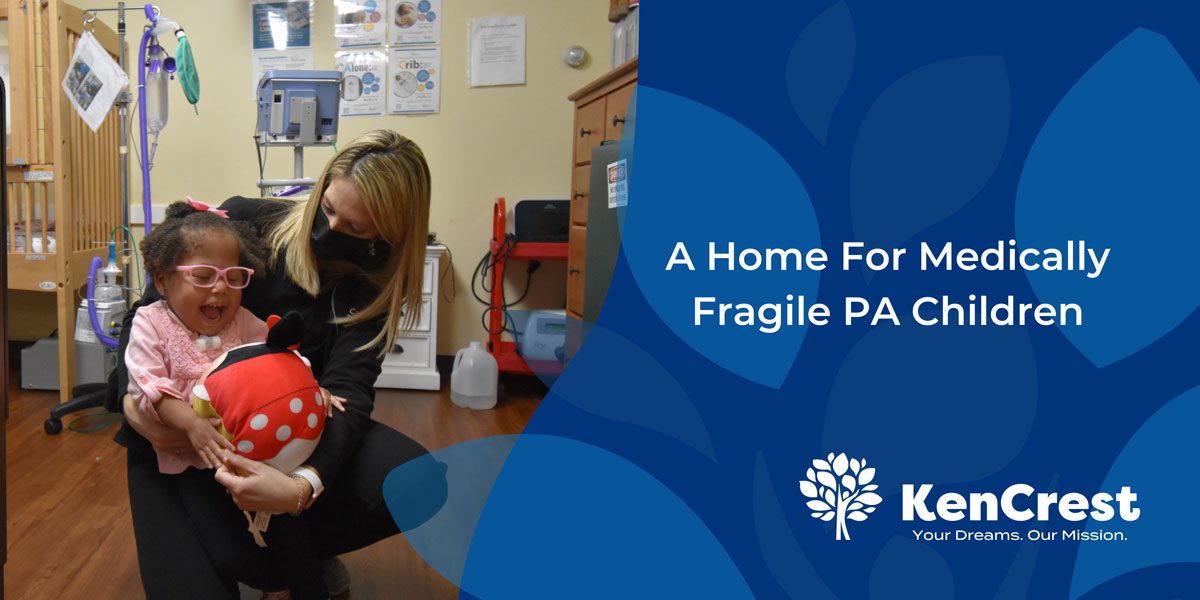A Home For Medically Fragile PA Children

KenCrest’s Medically Fragile Transitional Care Homes bring state-of-the-art care to a home environment for kids with complex medical needs.
By Sydney Kerelo
Turning onto Waterman Avenue in Philadelphia sits a brick home that appears on a downslope hill like any other. But this home, while it seems like any other on the block, houses several of KenCrest’s medically fragile children who receive care from a dedicated team of nurses.
Outfitted with state-of-the-art equipment, the Waterman Avenue and Ridge Avenue Transitional Care homes provide technologically dependent children with a comfortable home environment while transitioning from the hospital to home care. Medically fragile children may require ongoing support beyond the care they can receive at home.
“To be medically fragile means that you are not 100 percent healthy, and something is causing you to need more medical attention than your typical child,” says Kate Brown, the Nurse Care Coordinator overseeing both Medically Fragile Children’s homes. “It means that you need medical technology to help improve your health status.”
Since 1991, KenCrest’s Transitional Care Homes have offered special care designed for infants, toddlers, and children with complex medical needs. Each home is located near several superior pediatric medical facilities, like the Children’s Hospital of Pennsylvania (CHOP), and can support up to six children simultaneously. Both houses are staffed with around-the-clock care by two nurses and a Direct Support Professional 24/7.
A medical director affiliated with Nemours Children’s Hospital in Wilmington, DE—formerly known as A.I. DuPont—also leads KenCrest’s skilled team of nurses, physical therapists, occupational therapists, speech-language pathologists, and social workers to provide the best care for each child.


Two children’s bedrooms in the Waterman home // Photos by Aubrey Hoffert
According to Brown, each home typically takes in children under two years of age who need 24 hours of skilled nursing and therapy services. For example, many children in each house were born prematurely with a complex medical need, such as having a tracheostomy or a severe developmental delay.
But rather than sit in a hospital setting, KenCrest’s medically fragile children can live in an actual home surrounded by toys, love, and laughter, something many wouldn’t get in a hospital setting. And families get to visit their children as often as they like in a home setting rather than go through a hospital.
“It’s essential to have these types of homes because otherwise these children would be sitting in a hospital and they wouldn’t be able to reach their fullest potential,” adds Brown. “There’s only so much that the hospital setting can provide as far as socially, and at KenCrest, it’s more of a home feel which is comparable to what these families are going to bring their children home to.”
For 11 years, Brown has worked at KenCrest, ensuring that all medically fragile children within our programs receive the proper support and care to thrive and grow. As the Nurse Care Coordinator, she liaises between physicians and nurses, working with them to develop each child’s medical care plan and communicates with local hospitals to help them find placement for medically fragile children in the NICU or another unit where they could be discharged but need a steppingstone between the hospital and home.

Brown believes that having an in-between home for children with complex medical needs is essential because they get the best support and live a meaningful life, which starts by placing them in the best environment.
Every week the nurses and support staff bring school-aged children into the community with their families to do typical outings like the movies, the aquarium, or the zoo.
“It’s such a team-oriented program here,” says Brown. “The nurses and staff are like one big family, and we care so much for the children and each other and the families we support. I love that we get to bring the kiddos in when they’re young and watch them grow and develop developmentally, improve mentally, and then get discharged to their families. It’s very rewarding.”
Learn more about KenCrest’s Medically Fragile Transitional Homes by clicking the link below or how to join our nursing team!
